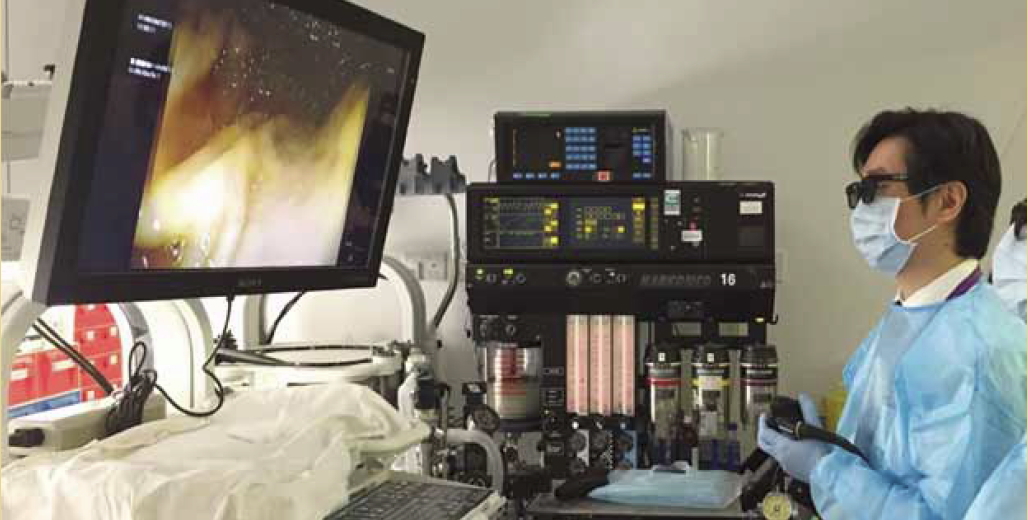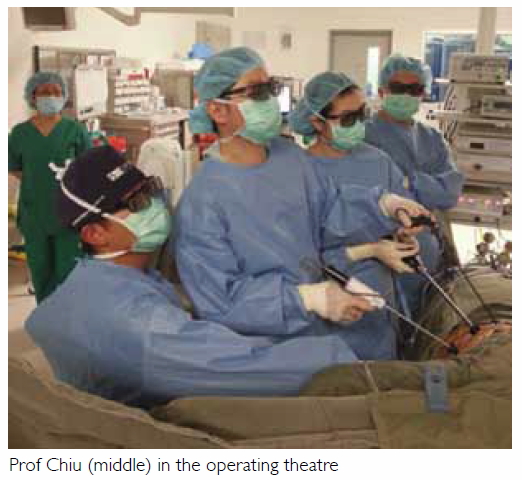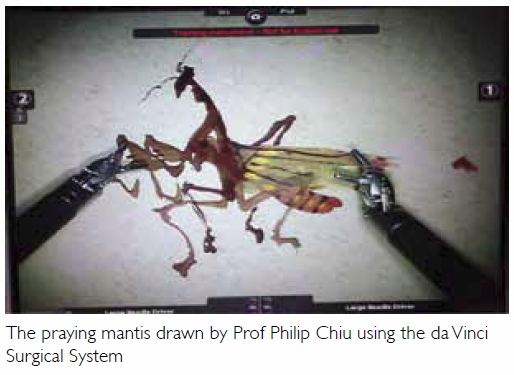© Hong Kong Academy of Medicine. CC BY-NC-ND 4.0
DOCTOR FOR SOCIETY
The scalpel and the brush: an interview with Professor
Philip Wai-yan Chiu
Rex WH Hui, Alex QY Liu, Andie CH Wu
Year 5, The University of Hong Kong
Since his graduation from the Chinese University of
Hong Kong (CUHK) in 1994, Prof Philip Wai-yan Chiu has established an
illustrious career as an academic surgeon. Currently, he is Professor in
the Department of Surgery at the CUHK, Assistant Dean of the CUHK Faculty
of Medicine (External Affairs), Director of the CUHK Jockey Club Minimally
Invasive Surgical Skills Centre, and Director of the Chow Yuk Ho
Technology Centre for Innovative Medicine.
Surgical career
An expert in endoscopic and minimally invasive
surgery (MIS), Prof Chiu has been instrumental in the development of his
field both locally and internationally. He fondly recalls how MIS
stratospherically emerged from laparoscopic cholecystectomy—the only MIS
in his early career—to its current ubiquity over the last two decades.
What he is most impressed by is the number of patients who have benefited
from the less-traumatic surgical experience.
To study the advanced endoscopic techniques of
upper gastrointestinal cancer management, Prof Chiu pursued studies in
Japan in the early 2000s, and was the first to bring endoscopic submucosal
dissection (ESD) machinery out of Japan. He strives to apply cutting-edge
technology to benefit local patients, and he performed the first ESD and
the first per-oral endoscopic myotomy in Hong Kong in 2004 and 2010,
respectively. In the Asia Pacific Digestive Week 2016, he received the
‘Emerging Leader Lectureship’ award from the Journal of Gastroenterology
and Hepatology Foundation.
Broadening one’s reach via education and innovation
Outside the surgical field, Prof Chiu further
contributes to the community by focusing on education and staff
development. “While performing surgery can help patients,” he explained,
“teaching and furthering medical science allows more patients to benefit.”
Apart from the education of medical students at the
CUHK, Prof Chiu strives to share medical knowledge with his engineer
colleagues and engineering students, as he sees the potential of
interdisciplinary collaboration between engineers and doctors, whereby
doctors’ clinical experience paired with engineers’ mechanical expertise
can enable the development of novel surgical instruments. To further
promote revolutionary biomedical engineering research, Prof Chiu was
involved in establishing the Chow Yuk Ho Technology Centre for Innovative
Medicine in the CUHK, where he currently serves as its inaugural director.
Continuous innovation, he stresses, is the key to improved patient care.
Prof Chiu currently chairs the Asian Novel
Bio-imaging and Intervention Group, an academic interest group that aims
to train endoscopists and promote early gastrointestinal cancer
management. Since its inception in 2014, the group has organised over 50
training courses and trained over 1200 doctors.
Serving with paintbrushes
When asked about why he chose surgery as his
career, Prof Chiu was quick to attribute it to his interest in traditional
Chinese painting. A pupil under the Lingnan School of Chinese Painting
since his teenage days, he believes that the Chinese art has trained him
in discipline, planning, and manual dexterity; all of which are crucial
virtues of a successful surgeon.
Throughout his hectic surgical career, Prof Chiu
has maintained his passion for art and has shared exhibitions with
professional painters—his traditional depictions of sometimes medical
themes, for example the view in an operating theatre, have been said to
bring new elements to the school.
Art is at the same time another means to serve his
school. During the celebrations of the 35th Anniversary of the CUHK
Faculty of Medicine, Prof Chiu drew a traditional Chinese painting that
was then auctioned, with the proceeds used to promote further development
of his alma mater.
Recently, Prof Chiu combined his impressive
surgical and artistic talents by using the da Vinci Surgical System to
paint a praying mantis. While this innovative endeavour enabled him to
explore his interest in both art and science, it also showcased the fine
movements and dexterity of the System, further supporting the potential of
robotic surgery.
“We need to be accountable to our patients”
On a personal level, Prof Chiu cherishes his work,
as his research satisfies his inquisitiveness and yields clinical benefits
in patients. While he admitted that the cutting-edge technology is
fascinating in itself, he reiterated that healing, similar to traditional
Chinese painting, is an art. “As doctors, we have to be accountable to our
patients and must strive for the best patient care at all times,”—and he
himself has certainly been doing exactly that.
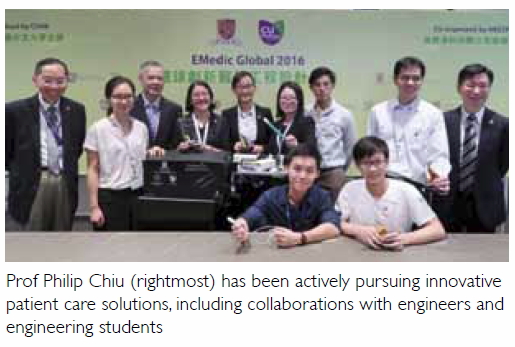
Prof Philip Chiu (rightmost) has been actively pursuing innovative patient care solutions, including collaborations with engineers and engineering students
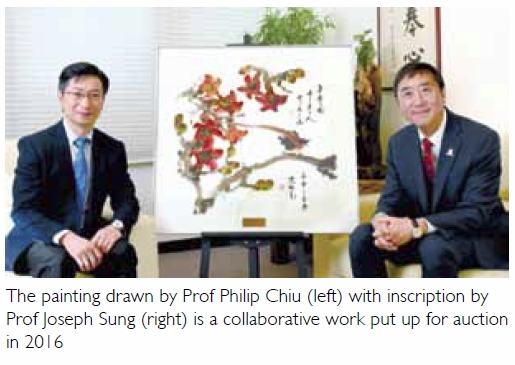
The painting drawn by Prof Philip Chiu (left) with inscription by Prof Joseph Sung (right) is a collaborative work put up for auction in 2016


